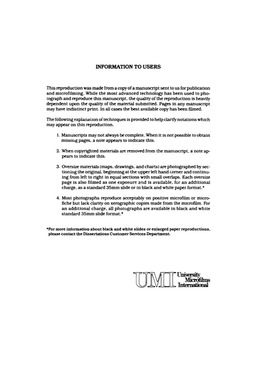| dc.contributor.author | Spigner-littles, Dorscine, | en_US |
| dc.date.accessioned | 2013-08-16T12:29:28Z | |
| dc.date.available | 2013-08-16T12:29:28Z | |
| dc.date.issued | 1985 | en_US |
| dc.identifier.uri | https://hdl.handle.net/11244/5396 | |
| dc.description.abstract | Unique skills reported in response to open-ended items reflected the core values and philosophy of the student personnel and student development movement. These skills indicated that practicing CSAOs report a desire to serve the operational needs of students. In contrast, the respondents' identification of the ten highest ranked items and ten lowest ranked items failed to suggest a student orientation. | en_US |
| dc.description.abstract | Tests of significance revealed that gender, educational background (field related vs. non-field related) and the interaction of the two variables had differential effects on Factor I, while the tests on Factor II revealed no significant differences among the four subgroups. The results indicated that the female CSAO whose training was non-field related had higher means in overall ratings of skills, meaning that they rated each of the skills as being of less importance than the other three groups. They placed a high focus upon the accomplishment of specific tasks that were direct components of the student services functions. | en_US |
| dc.description.abstract | From a review of pertinent research and literature, a questionnaire was developed and sent to 197 CSAOs at state universities with student populations of 9000 or more. Responses were received from 153 which generated 139 usable questionnares or 71% of the targeted population. | en_US |
| dc.description.abstract | Factor analysis of the skills identified from the literature resulted in two principal factors being identified and retained, Conceptual Skills and Technical Skill. | en_US |
| dc.description.abstract | The purpose of this study was to determine from practitioners, perceptions of the skills most important to Chief Student Affairs Officers (CSAOs), to determine if there were differences in perceptions based upon differences in gender (male vs. female) and educational background (field related vs. non-field related), and to determine if there were skills or competencies perceived as being unique to the field. | en_US |
| dc.description.abstract | Ranking the skills by mean values revealed that the sample group fundamentally agreed that CSAOs needed human relations skills, basic administrative skills, decision making ability and an organizational sense of the function of student affairs in relation to the whole institution. Seven of the ten competencies that the CSAOs reported as not necessary were skills that could be delegated to subordinates. | en_US |
| dc.format.extent | xi, 194 leaves : | en_US |
| dc.publisher | The University of Oklahoma. | en_US |
| dc.subject | Student activities. | en_US |
| dc.subject | Personnel management. | en_US |
| dc.subject | Education, Higher. | en_US |
| dc.title | Perceptions of skills and competencies necessary to become an effective Chief Student Affairs Officer / | en_US |
| dc.type | Thesis | en_US |
| dc.thesis.degree | Ph.D. | en_US |
| dc.note | Source: Dissertation Abstracts International, Volume: 47-02, Section: A, page: 0438. | en_US |
| ou.identifier | (UMI)AAI8603520 | en_US |
| ou.group | Other | |
